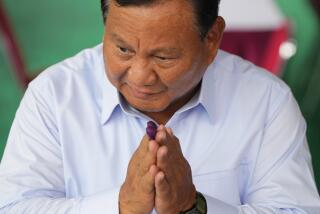Champagne in Jakarta; Challenges in the U.S.
- Share via
“When we heard the news from New York, we broke out a bottle of champagne,” the U.S.-educated Muslim couple e-mailed from Indonesia Sept. 11. Not only U.S.-educated, but indirectly U.S.-employed. “It served you right--supporting that terrorist [Israeli Prime Minister Ariel] Sharon.”
Muslims in other parts of the world have a different global perspective. And although Islam is much less intense in the world’s fourth-most-populous country--they were drinking champagne, after all--these friends in Jakarta view the war against terrorism through the same lens as most educated Muslims in Nigeria, Senegal, Algeria or Syria.
The connections in Southeast Asia are much closer to Al Qaeda than is generally realized. An Osama bin Laden brother-in-law lived in the Philippines for two years and helped found the Abu Sayyaf, an Al Qaeda affiliate that has decimated Philippine tourism with its kidnappings and murders.
But whereas Islam’s following is a small minority in that nation, it’s a vast majority in Indonesia. It is claimed that as many as 30,000 young Indonesians went to Afghanistan in the 1980s to fight the Soviets. More than 1,000 went to Egyptian universities in the same period and at least that number to the same Pakistani schools--the madrasas --from which most of Bin Laden’s associates emerged.
But Indonesia is secular and historically moderate. President Megawati Sukarnoputri, in Washington last month, promised to join the coalition against terrorism. Back home, however, her vice president expressed the hope that the Sept. 11 atrocities would “cleanse” the United States of its sins. She couldn’t deliver on her commitment to President Bush. There are two reasons.
First, the secession movements in Indonesia, especially in Aceh: Military repression there has caused a tilt toward Islamic fundamentalism and fueled radicals. More directly, the founding last year of the extremist Laskar Jihad, with thousands of members, gave unemployed youth a mission.
Laskar Jihad may not be an explicit Bin Laden affiliate, but it’s a distinction without a difference. Its leader, Ja’far Umar Thalib--another Yemeni by family origin--has been in touch with Bin Laden since 1987. Roaming through Java recently, its members demanded that hotels hand over Americans, and it was simply good luck that blood didn’t flow.
Americans have been evacuated from Indonesia, and the State Department has advised them not to travel there. But explicit threats intercepted by intelligence agencies made the danger to visibly placed U.S. citizens palpable.
The second reason for the hostility to U.S. policies in Indonesia is the policies themselves. Throughout the Islamic world, U.S. policy is seen as leaning toward Israel. As long as the peace process was moving, it was possible to have intelligent discussion of U.S. policy in Islamic countries. Once Sharon, whose brutalities in the 1982 war in Lebanon were well-publicized throughout the Islamic world, came to power and the process came to a halt, Indonesians hardened in their attitudes.
True, much of the opposition to U.S. policies comes from jealousies and frustrations in countries that have not found the U.S. formula for success.
And Washington has done a poor job of communicating.
The fact is, though, that while most Indonesians just want their economy to recover and to get on with their lives, the direction of policy comes increasingly from the radicals. The Laskar Jihad may have only a few thousand hard-core members but it is growing and, through its demonstrations and threats, puts huge pressure on Megawati.
The longer the war on terrorism goes on, the stronger the Laskar Jihad will grow, and with it the now-routine demand for Sharia (Islamic) law and a far more militant commitment to the religion and its perceived interests worldwide.
One influential Jakarta official argued, however, that a quick war and a breakthrough in the peace process in the Middle East might dramatically undercut Laskar Jihad’s appeal. “The Laskar Jihad lives in the psychic space created by our own failures and by all our frustrations at American policies in the Middle East.
“For our own sake, we hope we can come back together with you. We are finished as a great nation if we don’t remain secular and moderate, a magnet for investment and tourism. Our young democracy is also at risk.”
That’s a lot to worry about, and the champagne well symbolizes the challenge.
More to Read
Sign up for Essential California
The most important California stories and recommendations in your inbox every morning.
You may occasionally receive promotional content from the Los Angeles Times.










